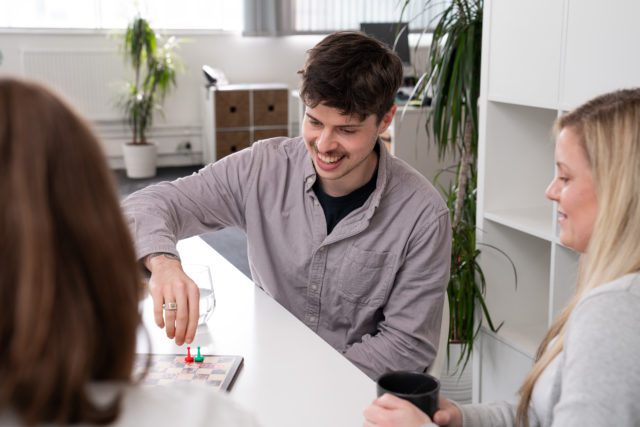Website speed and performance are massive parts of SEO and user experience. User experience is also incredibly important to Google because they can track how long a user stays on your website, whether they click through to any pages and, most importantly, whether they leave your site and click on someone else’s. In a Google Webmaster Video, it’s stated that “2 seconds is the threshold for eCommerce website acceptability”. If this doesn’t prove the importance of site speed then maybe this will: one study has shown that a site that loads in 1 second has a 3x increase in conversions as a site that loads in 5 seconds.
So, how do you audit site speed and performance? Website speed can be audited using various (free) tools available on different websites such as Google PageSpeed Insights, GTmetrix, ShortPixel, and DotCom-Tools. These tools give us more information about where speed and performance can be improved.
Read on for more information with a step-by-step explanation of how to audit site speed, along with information about why site speed should be considered for SEO and how we can improve any issues we find.
To make improvements to a website’s speed we must first understand where the website is failing. Luckily, there are various tools we can use, free of charge, that give us a good idea of where improvements can be made. We’ll go through each tool, explain what the tools hope to achieve, and any potential opportunities they identify.
PageSpeed Insights is a free tool from Google that gives us a look at how they rank your site speed and performance on both Mobile devices and Desktop.
Mobile Test:

Desktop Test:

The majority of websites have a worse mobile score than desktop score. It’s advised to have a score of at least 50 on mobile and at least 90 on desktop if possible. As we’re entering into a mobile-first world, mobile speed/performance will become more important, therefore prioritising mobile performance is a good idea moving forward.
Below are the data analyses of mobile and desktop. These focus on the metric times that do or do not need improvement. One of the main focuses we’re looking at is Largest Contentful Paint (LCP). This is how long the main content of a web page takes to load, which should not be any more than 2.5 seconds. Ideally, we’d like to make this less than 2 seconds. While Cumulative Layout Shift isn’t to do with site speed, this is another SEO factor within Core Web Vitals which needs to be 0.1 or less.
Mobile:

Desktop:

Google will then give advice regarding “Opportunities”. Shown within this area are the potential areas that can be fixed to improve the overall PageSpeed Insights score for desktop and/or mobile. It’s clear in this example that mobile has a few areas that need help, the main 3 include Reduce unused JavaScript, Reduce initial server response time, and Eliminate render-blocking resources.
Mobile:

Desktop:

DotCom Tools has a free speed test tool that’s used to test the page loading speed that users will see from different areas of the world. This tool tests the first and second visits because the second visit is usually faster due to a page or browser cache. We want around 2.0 seconds load time or less. Anything over 3.0 seconds needs to be fixed. If your website is for a business that only offers services located in a specific country or state, then the time to load the site within that area is the most significant.

GTmetrix is another free tool that helps analyse website speed performance.

GTmetrix offers similar advice to Google PageSpeed insights but also gives more information on other potential improvements such as using a Content Delivery Network (CDN) to serve pages in different geographic locations. CDNs cache pages on their servers in certain countries so that it loads faster the next time someone in that area or location goes on the website.
ShortPixel is a free tool used to see if you need to compress any images on your website. While it isn’t always fully accurate in terms of potential percentages of image compression, the website gives you a general idea of whether images could be compressed or served as new-gen files to improve overall loading times.
![]()
When attempting to improve website speed there are a few considerations. The first thing to consider is the Content Management System (CMS). If you’re on a CMS that limits access to certain areas of the administration area, such as the website code, it may be harder to improve website speed than if you had access.
Another thing to consider here is that, even if you do have access to these areas, you may have a hard time understanding or putting into practice the potential improvements. This is where you may need to hire a web developer, SEO expert, or site speed specialist.
A Content Delivery Network (CDN) is a network of servers placed in many geographic locations throughout the world. This decreases the load times of the website within these locations by caching pages on the servers. If you’re looking for a reputable CDN, Cloudflare offers a free CDN service along with other security and performance services.
Excess or unused code within websites is common. It’s therefore a good idea to reduce, remove, or minify code that would otherwise cause larger load times.
When an image is first saved it can usually be compressed to reduce irrelevant image data so it’s a significantly smaller size (in terms of load) but the image quality isn’t affected so much that it ruins user experience. With the creation of new-gen image files such as WebP, images can now be saved as this file type and served on websites to reduce loading times even more.
If your website is built on WordPress you have many options to improve website speed. Deactivating and deleting excess plugins has been shown to improve site speed and performance dramatically.
However, there are additional plugins that can help improve site speed. A backup from the host (not from a plugin) should always be downloaded before installing any plugin. These plugins include:
Since 2010, Google has been using site speed as one of their ranking factors and has said on regular occasions that a faster site will help you rank better. However, rather than overall speed being a direct ranking factor, Google has included certain areas of site speed and other user experience metrics within their Core Web Vitals.
Website speed can affect user interactions on a website. While this is bad for conversions (i.e. sales or enquiries), this is worse for SEO. If a page is taking a large amount of time to load, a user will likely become frustrated, impatient, and/or bored, then click off the page back to Google to find a faster, more efficient website.
This shows Google that the slower website isn’t helpful to users, as the bounce rate from the website towards another website is high. This will then rank other, quicker websites higher as this shows Google those websites have helped users more effectively as there are more user interactions.
If site speed performance, tools and fixes are still leaving you a little confused or unsure of what you need to do, our expert SEO team at Wildcat Digital can help. Site speed is one of the first technical SEO tasks that we complete as part of your campaign to help get things moving in the right direction. Learn more about this in our recent blog post, What is a Technical SEO Audit & Why is it Important?.
Get in touch with us today to learn more about our SEO services.

Founder
Our founder, Will Hitchmough, worked at a number of high profile Sheffield Digital Agencies before founding Wildcat Digital in 2018. He brings an extensive knowledge of all things related to SEO, PPC and Paid Social, as well as an expert knowledge of digital strategy.
Digital Marketing can be a minefield for many businesses, with many agencies ready to take your money without knowing how to deliver results. I founded Wildcat Digital to deliver digital success to businesses with smaller budgets in a transparent way.

Head of Growth
Rich joined us in May 2024 to head up our growth team. With years of experience helping other agencies to grow, Rich joins us at an exciting time as Wildcat is working on a five-year plan to become one of the biggest agencies in the UK.
Outside of work, Rich is a father to three children, which keeps him very busy! He’s also recently started running again to keep fit and loves a bit of DIY.

Head of Digital
Sarah joined Wildcat in January 2025, bringing over seven years of SEO expertise to the team. With a background in Fashion Communication and Promotion, she has worked both in-house and at agencies, covering a range of digital marketing specialisms before focusing on SEO.
Passionate about all things search, Sarah thrives on helping brands grow their online presence.
Outside of work, she enjoys walking her dog, running, and shopping for vintage clothing.

Office Manager
Amelia joined Wildcat Digital in January 2025, bringing extensive experience in HR, Health & Safety, Facilities Management and IT Support. Previously an Operations Manager at The University of Sheffield, she has a strong background in creating efficient and well-organized work environments.
Specialising in HR, Health & Safety, and Facilities Management, Amelia ensures the Wildcat Digital team has the resources and support needed to thrive. Whether managing office operations, maintaining compliance, or fostering a positive workplace culture, she keeps everything running smoothly.
Outside of work, Amelia loves trying new things, traveling, camping, and walking. She also enjoys socialising and exploring new places with friends and family. Her adventurous spirit and proactive approach make her a valued member of the team.

Client Success Coordinator
Siena joined us in 2023 with a background in sales and digital marketing. She leads on client relationships across the company, ensuring that our customers are happy throughout their journey with us, from their initial consultation through to onboarding and beyond.
Outside of work, Siena enjoys travelling and getting stuck into the local culture. She likes to make the most of her experiences and particularly enjoys watching sunrises and sunsets from beautiful locations around the world.

SEO Account Director
Paul has a strong background in SEO, having previously founded and ran a successful eCommerce business, as well as running a personal blog that achieves an average of 17K users per month. Paul’s knowledge of SEO is extensive, with a strong emphasis on client handling and technical SEO.
Outside of work, Paul enjoys spending time with his family and staying active with weight lifting and combat sports.

Team Lead & Technical SEO Account Manager
With a degree in Computer Science and SEO experience dating back to 2017, Dariusz has a wide range of SEO skills and knowledge. His specialist knowledge of Technical SEO has firmly landed him the title of Wildcat’s Technical Wizard, and he has recently taken on the responsibility of Team Leader for the Panthers Team.
In his spare time, Dariusz loves hiking, experimenting and trying new coffees and loves learning new things. He is currently learning more about CRO and AI and how this could benefit our clients.

Team Lead & Senior SEO Account Manager
With a background in sales, Molly is a natural Account Manager, brilliantly handling any issues that come her way. Having joined us as a Digital Marketing Executive, and working part-time through her final year of University, Molly is a shining example of how hard work pays off. She is now an SEO Account Manager with a particular interest in Content and Client Management.
In her spare time, Molly loves to get out in nature, hiking and exploring the Peak District. She also loves cooking and likes to unwind with a bit of yoga.

PPC Team Leader
Libby joined Wildcat in 2021 as our first PPC hire. With a degree in Digital Media Production, a Master’s in Digital Media Management and previous experience in Social Media Management, Libby hit the ground running and has since climbed the ranks to Senior PPC Account Manager and has a particular interest in the eCommerce sector.
Outside of work, Libby likes gaming, and cooking and likes to keep active by lifting weights.

Senior SEO Account Manager
With a degree in Film and TV production, and a varied career history, Jamie made the move to marketing with a Masters degree in Digital Media Management. He has since worked in SEO at Agencies across Sheffield, before joining Wildcat and working his way up to SEO Account Manager. Jamie has a particular interest in backlinks and Digital PR and has recently gained a client a valuable backlink from Forbes!
In his spare time, Jamie is an avid foodie and loves trying new restaurants and cuisines. He also loves to travel and spent a year travelling to Australia after university.

SEO Account Manager
Jasmine joined Wildcat in 2022 with a strong background in SEO and Account Management. At the time, she was finishing up a Level 4 Apprenticeship in Digital Marketing from the Chartered Institute of Marketing, and has since worked her way up to SEO Account Manager. Jasmine excels at content writing and promotion, and particularly enjoys finding creative ways to join the dots on multi-channel campaigns.
In her spare time, Jasmine volunteers at a charity, helping combat loneliness & social isolation experienced by older neighbours. Outside of Wildcat, she owns a catering company, Savery Grazing, creating delicious grazing tables & platters for a range of events. She also loves skiing and exploring the Peak District.

Senior SEO Executive
After spending ten years managing businesses, restaurants, cafes and event spaces across Sheffield, Jon decided to change careers and joined Wildcat as an SEO Executive in 2022. He especially enjoys the client management side of the job, helping them to understand digital marketing and ways in which they can build their business’s presence online.
Outside of work, Jon likes to keep fit with running, badminton and football, and also loves music.

Senior SEO Executive
Andy joined Wildcat in 2023 after starting his digital marketing career in-house for a local Sheffield company. Since joining, he has developed a strong interest in Technical SEO and has strong skills in Account Management.
Outside of work, Andy loves music and plays in a couple of bands. He also enjoys rock climbing, cycling, photography and good food.

PPC Executive
Before joining Wildcat, Tom worked across different industries, building skills in sales and customer service. He later developed a passion for digital marketing whilst working on personal marketing projects and freelance ventures, and gained numerous certifications in PPC and Social Media.
Outside of work, Tom enjoys staying active by going to the gym and hiking. He also loves travelling and motorbiking.

Senior SEO Executive
Kezia joined us in July 2024 after completing a CIM Certificate in Digital Marketing and gaining experience in Content SEO at another Sheffield agency.
In her spare time, Kezia loves to get outdoors, bouldering, hiking and travelling.

Senior PPC Executive
Alex joined Wildcat Digital in December 2024 as a Senior PPC Executive, bringing a strong background in Paid Media, Paid Social, and Programmatic advertising. With a degree in Business & Marketing and Google Ads certifications, she has the expertise to craft high-performing campaigns that drive results.
Before joining Wildcat Digital, Alex worked at two leading agencies in Leeds, honing her skills across various digital advertising platforms. Her analytical mindset and strategic approach help businesses maximize their online presence and advertising budgets.
Outside of work, Alex enjoys spending time with her dog, Lola, and going on walks with her dog walking group. She’s also a keen footballer and loves playing five-a-side whenever she gets the chance. Her enthusiasm and team spirit make him a great addition to the Wildcat Digital team.

SEO Executive
Amy joined Wildcat in 2024 with a background in journalism, having worked as a News Editor and Editor-in-Chief at The Sheffield Tab. She is naturally interested in Content SEO and research, so will no doubt prove to be a content power-house.
In her spare time, Amy loves watching crime shows, listening to music and hanging out with her dog, Eddie!

SEO Executive
Reiss joined the Wildcat Digital team in July 2025, with a background in journalism and digital content, Reiss brings both creativity and technical know-how to the team.
After graduating with a Journalism Studies BA from the University of Sheffield, where he also served as Games Editor and Deputy Editor for the student-run newspaper – Reiss jumped straight into the world of climate tech communications.
Outside of work, Reiss loves crochet, swimming, playing guitar, and diving into both video and board games. He’s always up for picking up new skills and trying new things – which makes him a perfect fit for our team!

Content & Proposal Writer
Liv joined the WildcatDigital Team in June 2025, with a strong background in financial admin and client care, Olivia is taking an exciting step into the creative world – and we’re so glad she’s doing it with us!
She’s currently studying content creation through her apprenticeship with Wildcat, and already bringing fresh energy and creativity to the team.
Outside of work, Olivia runs her own BIAB nail business, loves reformer Pilates, long walks, and is a member of a competitive dance team.

December 17, 2025
As we enter into 2026 and reflect back on the year as business owners and digital marketers, we can’t help…

December 17, 2025
Could your website be too ‘thin’ to rank well? Are you even aware of the ways it could be lacking…

December 17, 2025
Creating effective website content relies on choosing the right keywords and understanding how Google interprets them. Even with a strong…